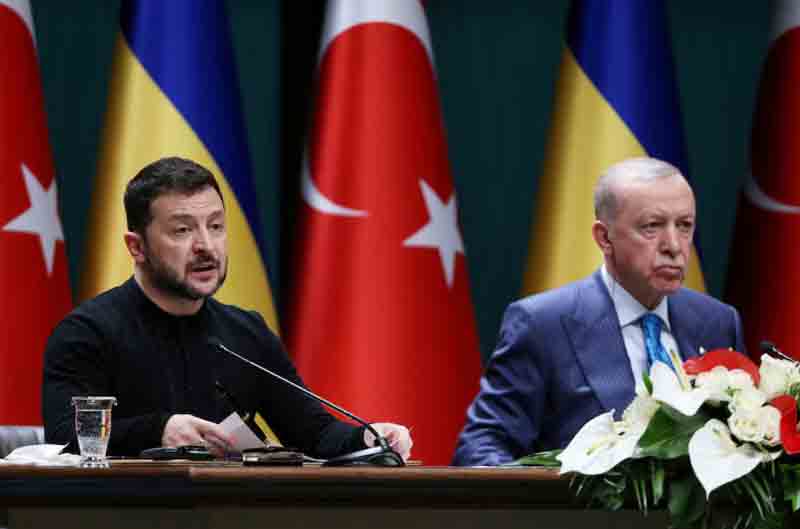Turkey is increasingly recognized as a significant potential ally in the reconfiguration of European security, according to diplomats and analysts. This comes as Europe seeks to enhance its defense capabilities and secure assurances for Ukraine in light of any upcoming ceasefire agreement advocated by the United States.
European nations have expressed concern over U.S. President Donald Trump’s strategy to resolve the Ukraine conflict, which has disrupted Washington’s foreign policy, diminished Russia’s isolation with the prospect of improved relations, increased pressure on Kyiv following unproductive discussions with Ukrainian President Volodymyr Zelenskiy, and jeopardized transatlantic relations.
Experts suggest that Europe’s efforts to sustain Ukraine’s military strength and establish security guarantees, while simultaneously enhancing its own defense independent of the U.S., have created a unique opportunity for Turkey to strengthen its connections with Europe. This is occurring despite ongoing tensions regarding the rule of law, maritime disputes with Greece and Cyprus, and Turkey’s long-delayed bid for European Union membership. “European nations that believed they could afford to exclude Turkey until now are realizing that such exclusion is no longer viable,” remarked Sinan Ulgen, a former Turkish diplomat and director of the Centre for Economic and Foreign Policy Studies (EDAM).
After discussions with President Erdogan in Ankara on Wednesday, Polish Prime Minister Donald Tusk stated that he presented a “clear proposal for Turkey to assume significant co-responsibility” for peace in Ukraine and regional stability. A senior European diplomat noted that Turkey possesses “very important perspectives” on the requirements for achieving peace in Ukraine. The diplomat highlighted that President Erdogan has successfully navigated his relationships with both Zelenskiy and Russian President Vladimir Putin during the conflict, making his involvement logical.
As a NATO member, Turkey boasts the second-largest military within the alliance. In recent years, it has begun manufacturing its own aircraft, tanks, and naval vessels, and it exports armed drones worldwide, including to Ukraine. In 2024, Turkey’s defense industry exports reached $7.1 billion.
In a flurry of discussions and decisions following Trump’s return in January, several European countries have contemplated the establishment of a “coalition of the willing” to support Ukraine. France has expressed its willingness to consider extending its nuclear protection to its allies.
Turkish President Erdogan and Foreign Minister Hakan Fidan have emphasized the necessity for Europe to incorporate Turkey into the restructuring of its security framework in a manner that is both “sustainable and deterrent.”
A Turkish official, who preferred to remain unnamed, indicated that there are currently no definitive plans regarding a new European security architecture or Turkey’s potential role within it. However, he noted that certain initiatives could enhance collaboration. “Rather than involving Turkey in projects on a selective basis, it would be more sensible for Europe to pursue partnerships in a comprehensive manner. For instance, they could begin by integrating Turkey into the European Peace Facility program,” the official stated to Reuters, referencing an EU initiative aimed at supporting Ukraine.
COMMON INTERESTS
A representative from the Turkish Defence Ministry highlighted that Ankara and Europe share mutual interests, ranging from counter-terrorism to migration. He asserted that Turkey’s full engagement in EU defense initiatives is essential for Europe to assert itself as a global player, adding that Turkey is prepared to contribute to the development of the new security framework.
Despite this opportunity, analysts point out that Turkey’s relationship with Russia poses a significant challenge. Ankara has refrained from imposing sanctions following Moscow’s invasion of Ukraine and maintains strong connections in energy, tourism, and trade.
“The critical issue for Turkey will be its relationship with Russia, as the foundation of Europe’s security framework hinges on perceiving Russia as a threat,” Ulgen remarked, noting that Ankara must make a decisive choice regarding its stance on Russia to assume a more prominent security role.
Turkey has provided military support to Ukraine and affirmed its commitment to the country’s territorial integrity and sovereignty. It facilitated peace negotiations in the early stages of the conflict and has expressed willingness to host future discussions while also working to revive an agreement on navigational safety in the Black Sea.
A source from the Turkish Defence Ministry indicated last week that Turkey might be open to participating in a potential peacekeeping operation in Ukraine, contingent upon the establishment of a ceasefire. This week, Turkey’s Chief of General Staff, Metin Gurak, attended a gathering of European military leaders in Paris, where he engaged with his British and French counterparts, who have also been in discussions about troop deployment.
Another European diplomat emphasized the importance of Turkey’s involvement in providing security assurances for Ukraine. “Erdogan’s interests are aligned with ours at this moment, particularly since he no longer has the same dynamic with Russia in Syria,” the diplomat noted, referring to Russia’s support for former Syrian President Bashar al-Assad while Turkey has backed opposition forces for years. “Thus, it seems that the conditions are favorable for Turkey to assume a role in the future European security guarantees for Ukraine.”
Discover more from Defence Talks | Defense News Hub, Military Updates, Security Insights
Subscribe to get the latest posts sent to your email.




